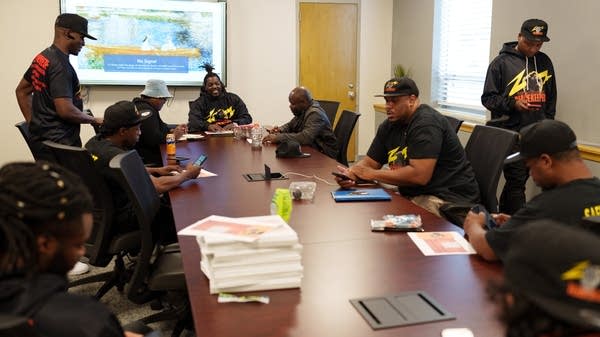Minneapolis weighs increasing funding for community violence prevention

Go Deeper.
Create an account or log in to save stories.
Like this?
Thanks for liking this story! We have added it to a list of your favorite stories.
This week Minneapolis Mayor Jacob Frey proposed a $1.8 billion budget which includes an increase in funding for community-driven violence prevention efforts. Supporters of the programs say it may be hard to measure their effectiveness, but that doesn't mean the programs are not working.
It has been nearly a decade since Charles Caine decided he wanted to make a difference in North Minneapolis, where he grew up.
“I was working as a forklift operator at a factory,” Caine said. “I was a single father and I was looking for something more meaningful in life, than just working a 9-to-5.”
Caine founded Brothers EMpowered, a community-based organization that provides outreach to local families of color that includes food shelves, job placement resources, and interventions in potential conflicts when it is safe to do so.
Turn Up Your Support
MPR News helps you turn down the noise and build shared understanding. Turn up your support for this public resource and keep trusted journalism accessible to all.
On Monday night, in a conference room inside of Christ the River of Life Lutheran Church in North Minneapolis, Caine helped train a group of a dozen Peacekeepers he employs to help spread these services. He explained it has taken many years to grow his organization to this point.
“We have people that volunteered their time for the first seven years in his organization,” Caine said.
Caine said training is helpful to help the Peacekeepers assess the needs of the people they meet, but their life experiences are the most valuable part of their skillset. It is empathy, Caine said, that can’t be taught.
“We are relatable,” Caine said. “You know your people and how they respond, what triggers them, so you can reach them.”

Brothers EMpowered is an example of the types of community-driven services the City of Minneapolis is increasingly leaning on for violence prevention.
Minneapolis Mayor Jacob Frey this week proposed raising the budget for violence prevention by more than $3.3 million for 2024.
Luana Nelson-Brown recently became Director of Neighborhood Safety with the City of Minneapolis, which used to be called the Office of Violence Prevention. She explained the goal is to use a public health perspective and evidence-based alternatives to policing addresses the root causes of violence.
“What we've seen across the country is, it actually has been shown to reduce violence. Of course, from community to community, those strategies are going to look different.”
Nelson-Brown says there isn’t a uniform way to track progress among various violence prevention efforts because they often vary in size and resources. The neighborhood safety office is currently focused on identifying the best strategies to invest in and measuring effectiveness would be the next step, Nelson-Brown said.
“That’s where we start to put in metrics to start to measure outcomes so that we can make sure where we put our focus is giving us the best return on investment.”
Many of the community-driven violence prevention efforts in Minneapolis began before the May 2020 murder of George Floyd, but they have gained more attention and more have started in the years since, as the city has been weighing alternative responses to public safety amid a shortage of police officers.
The number of homicides and shootings has gone down in the past year. At the same time, the city has increased resources for violence prevention efforts as the number of police officers has shrunk.

Mayor Frey has said the reduction in violent crime is due in large part to a collaborative law enforcement effort called Operation Endeavor. The initiative, which began in the fall of 2022 is being led by the city’s Office of Community Safety - which includes Neighborhood Safety and its programs.
Council Member Jeremiah Ellison represents Ward 5, which encompasses the north-central part of Minneapolis. Ellison says it can realistically take a few years before any of the various services the city provides can be measured and analyzed.
“The idea that these programs need to be evaluated and improved, is not evidence that these programs are not working,” Ellison said of the community-based violence prevention efforts. “As part of city services, we have been filling potholes, fixing street lights, picking up the trash, putting out fires, and offering police services for over 150 years. And I don't think anybody has decided that we are done improving those services.”
The proposed Minneapolis budget also called for increased funding to the police department to support 731 sworn police officers, as well as more than $7 million to cover overtime and other law enforcement contracts and an additional $2 million for civilian positions within the Minneapolis Police Department. The mayor said funding community-based and police programs will be critical in preparation for court-ordered police reforms in the city.

Charles Caine said funding from the city of Minneapolis has been inconsistent over the years for his organization. This year Caine said he did receive city funding dispersed through neighborhood groups this year.
“We've been able to sustain ourselves from other contracts and events,” Caine said.
The Peacekeepers have grown over the years. They now carry tablet computers when they do community outreach to track the needs of individuals they encounter and try to set them up with the right type of help. It’s one way to try to gauge the reach of their services, but it also costs money and time to track those metrics. Caine explained violence prevention isn’t always about numbers, and the impacts often can’t be measured.
“It’s not too much of a science to it,” Caine said. “It's just about being engaged and being involved in every aspect of your needs in life.”
The Minneapolis City Council will now review the mayor’s recommended budget and will propose any changes in the coming months.




